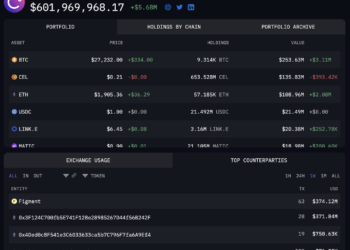- Cryptocurrency prices have declined significantly in 2022, with crypto assets tracking the performance of stocks such the Nasdaq 100.
- An overview of three top cryptocurrencies in Bitcoin, Ethereum and Ripple highlights the opportunities and risks that abound.
- Investors seeking to trade on contracts for differences, CFDs, for crypto need to do due diligence and understand how the contracts work.
Crypto has tracked high-risk assets like the Nasdaq 100 for much of 2022, crumbling as a result of the high inflation and high interest rates prevalent in the financial markets.
Bitcoin, the world’s largest digital coin, failed to get past $20,000 for most of September and October. However, amid multiple price predictions BTC managed to rise late that month after some modest indications that the US Federal Reserve was ready to ease policy.
Bitcoin price shot up 6.5% to $20,700 on October 29, and Ether followed by 19%. In context, the two largest crypto powers had suffered losses five of the last six months. Perhaps it wasn’t one single factor driving it, but rather “a more favorable backdrop for risky assets and short liquidations,” suggested NYDIG’s Greg Cipolaro.
One of the drivers for the rally may have been Dogecoin’s massive 40% surge that month, as crypto traders expected Elon Musk’s takeover of Twitter to give him a platform to promote the dog-themed coin.
One notable aspect of the crypto upswing was the fact that it happened at the same time as major tech stocks like Meta Platforms and Amazon.com were in the red. “Digital asset markets have shown early signs of tech decoupling,” Fundstrat’s Walter Teng announced.
Below are 3 top cryptocurrencies that we have used to outline and distinguish the above-mentioned “signs”, and crypto performance in November. Read on to find what else you can learn about trading cryptocurrency CFDs.
Bitcoin
In the second week of November, Binance CEO Changpeng Zhao said his company was on track to acquire FTX.com – the well-known crypto exchange co-founded by Sam Bankman-Fried – after the exchange lost liquidity following Zhao’s own sale of 530 million dollars from its FTX holdings.
Crypto trust was hit by the demise of FTX, whose native FTX token FTT, lost 75% of its value in a single day on November 9. SOL (the token of the Solana blockchain) reacted dramatically (because Solana is connected to FTX), dropping 36% on that day and bringing the total loss for the year to 90%. Bitcoin was 7.7% in the red, after an 11% loss the day before, which kept Bitcoin from breaking above $17,430.
The sentiment was memorable for Modular Asset Management’s Dan Liebau, who said that since 2016, “few periods have tested [the crypto industry’s] market infrastructure and participants as much as the past 24 hours.”
Ether
Has ETH been able to maintain momentum after its monumental September merge? Not according to some analysts such as BeQuant’s Martha Reyes who said in mid-September, “Now that the Merge excitement is over, we don’t have a catalyst for Ethereum any time soon“.
Ether lost 3.8% that day to hit $1,475 after dropping 6% the day before. Excitement over the upcoming Merge into a proof-of-stake system of validation, which would reduce the blockchain’s environmental impact and make it more efficient, had kept Ether afloat since mid-June.
The Merge itself was “certainly a success,” in the words of Ethereum developer Preston Van Loon. “What we’ll see over time is whether the stats hold up.”
A month later, Ether rallied 10.25% in just 24 hours. Internet lawyer Andrew Rossow thought it was due to a “combination of traders capitalizing” and “the success we’re seeing with some of the NFT projects thriving in the current bear market.”
According to Brett Sifling of Gerber Kawasaki Wealth & Investment Management, it was an overflow from the stock market rally. It will certainly be interesting to see how ETH prices will perform in the coming months for those trading cryptocurrencies in the form of CFDs.
Ripple
On September 19, traders braced themselves for higher interest rates on both sides of the Atlantic. This would mean that the cost of borrowing goes up, draining the liquidity needed in the crypto market. Bitcoin and Ether continued their losing streak, dropping 7.4% and 6.6% respectively, but XRP – the token created by Ripple Labs Inc. – fell as much as 13.5%.
A trigger may have been the news that the Securities and Exchange Commission (SEC) wanted an immediate ruling in the lawsuit they were pursuing against Ripple for its “reckless” conduct in failing to register XRP as a security. Also in September, Ripple filed a motion to dismiss the lawsuit, based on their position that XRP is ineligible as a security.
In the second week of October, Ripple CEO Brad Garlinghouse said the case would be resolved by the first half of 2023. The issue, he said, was “about the whole industry,” not just the world’s sixth-largest crypto.
In summary
When trading cryptocurrencies in the form of CFDs, it is always a good idea to understand the prevailing macro environment. For instance, what was Fed Chair Jerome Powell’s tone the last time he spoke? What did the latest inflation data tell us? And what recent events are shaping crypto sentiment?
Answering these questions and listening to the popular opinion of reputable analysts can help those trading cryptocurrency CFDs make more informed decisions.
Share this article
Categories
Tags
Credit: Source link









































































































































